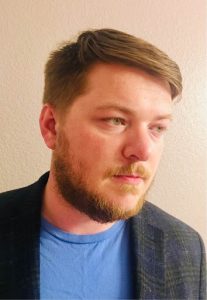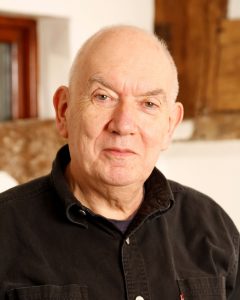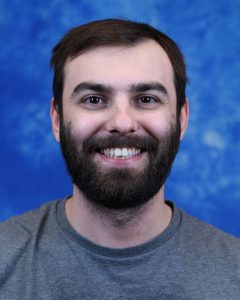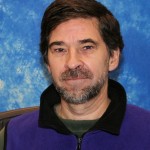
Dan Baronet
We do not know the details, but Dan’s luck ran out this week. On Tuesday, as he headed South from Nevada into California, en route to Mexico on the first leg of a four month motor cycle adventure to South America, something went wrong … Dan lost control of the bike and collided with a motor home, and many of us are now struggling to comprehend that Dan won’t be back.
Dan made friends everywhere that he went. On our annual Dyalog skiing “retreat” (we frequently did real work on prototypes of new tools, honest!), I was always impressed (while trying to hide my slight embarrassment) by the way Dan always kicked off conversations with hotel staff. Whether the waiters and waitresses were native Italians from the resort town – or migrants as hotel staff frequently are – Dan would typically know enough words in some shared language to get the conversation off to a good start (or he would extend his vocabulary on the spot). This always guaranteed us service with a smile, and excellent advice on which wine to order for dinner.
Dan gave as well as he got: on the slopes, Dan was always the first to stop by anyone who had fallen over and was struggling to get back up. Dan has friends all over the world and always took the time to visit them when he could, to keep the friendships alive. He was also happy to open his own home to travellers, both my kids had little Canadian adventures as guests of Dan and his family in Quebec, and Dyalog team members would also “couch-surf” chez Dan.
At work, Dan also loved extending his vocabulary. He remembered more details of different APL dialects than anyone else that I know, and was an expert in migrating code from one system to another. He also knew the weaknesses of each system, and was a feared visitor to vendor booths at APL conferences. Dan would mischievously sit down to play with a new APL system, try a couple of his favourite edge cases, and usually manage to crash new (and some old) APL interpreters within seconds.
But even when crashing interpreters, Dan was really trying to help the vendor produce a more stable platform. At work, as on the ski slopes, Dan was one of the few people who was always going out of his way to help. When he had spent time learning a new technique, or how to use a new tool, he would go the extra mile to create a utility library, document it, presented it at conferences and APL user meetings. He also did the really hard part – writing an article about it, making frequent contributions to Vector and other publications: http://archive.vector.org.uk/?qry=baronet&submit=search. He also enjoyed teaching APL, as an instructor at I.P.Sharp Associates and in the modern era as the author of numerous tutorials at https://www.youtube.com/user/APLtrainer.
More than 30 years ago, as an APL rookie at I.P.Sharp Associates, I was fortunate to meet, work with, and learn from Dan when he and I both found ourselves at IPSA Copenhagen. In addition to a general interest in tools, I shared Dan’s interest in the migration of code between APL systems, and flying airplanes. Dan actually flew small aircraft (and helicopters!) and I, like so many other friends and colleagues, admired him and got invited along for rides.
A decade and a half later in 2005, as the new CTO of Dyalog, I was keen to add an APL toolsmith to the company. Despite his location in Montreal, Dan was at the top of my list. Dan continued to live in Montreal but was a frequent guest in Bramley, coming over several times a year to spend some weeks to work with the growing “APL Tools Team” – and with the core development team on improving the quality of the interpreter by crashing it in as many ways as he could think of.
When his imagination ran out, he wrote code to generate even more ways to crash the interpreter. Dan has been cursed loudly many times, and will be remembered – if for no other reason than that it will be a long time before we are able to close the last “issues” that he logged in our problem tracking system. The quality of Dyalog APL has increased enormously in the last decade, and we have much to thank Dan for. Dan also “poured the concrete” for the foundations of the source code management tool (SALT) and the User Command framework that we are all starting to take for granted, and contributed to many other pieces of our growing collection of tools.

Dan often flew himself to APL User Meetings
Dan was an adventurer. He skied, snowboarded, snowshoe’d, biked, skated, hiked and flew – and with his great sense of humour and warm personality, he was able to entice many of us to come along with him to share. He photographed and brought his video camera, although he would often manage a 3-week trip to Europe which included a skiing trip, carrying only a small backpack.
Dan had just turned 60, and he had taken four months leave this winter to pursue an old dream to revisit South America with a friend – on motor cycles. They had wisely gone on a trial ride in the late summer, riding from Canada to Las Vegas and parking the bikes there in order to test the equipment and not have to ride two-wheelers in the Canadian winter. As a pilot, Dan understood risks very well – or rather, how not to take unnecessary ones.
“If only he had been a little more cautious”, some will say. Was that trip really necessary? These thoughts are unavoidable – but we have to remember that his decision to ride was natural to the adventurous and mischievous spirit that we all knew and loved.
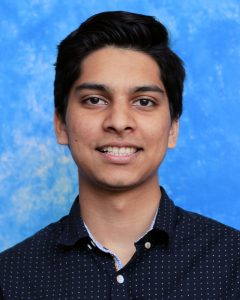


 Follow
Follow